A car that refuses to start can be incredibly frustrating. If you’re dealing with “car won’t start fuel problems,” this guide offers expert advice for diagnosing and fixing the issue, whether you’re a car owner, mechanic, or technician. We’ll cover everything from simple checks to more complex diagnostics, empowering you to get your car back on the road.
Similar to common car problems and solutions, fuel-related starting issues can often be resolved with a bit of troubleshooting. First, let’s explore some of the most common culprits behind “car won’t start fuel problems.”
Common Causes of Car Won’t Start Fuel Problems
Several issues can lead to a fuel-related no-start condition. These range from simple fixes like a lack of fuel to more complex problems involving the fuel pump, fuel filter, or fuel injectors.
Out of Gas: The Obvious Culprit
It may seem obvious, but running out of gas is a surprisingly common reason why a car won’t start. Before diving into more complex diagnostics, check your fuel gauge! If it’s reading empty or close to it, adding fuel is the first step.
Faulty Fuel Pump
The fuel pump’s job is to deliver fuel from the tank to the engine. A failing fuel pump can significantly reduce fuel pressure or prevent fuel from reaching the engine altogether. Symptoms of a bad fuel pump include sputtering, loss of power, and difficulty starting, especially after the car has been sitting for a while.
Clogged Fuel Filter
A clogged fuel filter restricts fuel flow to the engine. Over time, contaminants can build up in the filter, hindering its ability to do its job. Replacing the fuel filter is a relatively simple and inexpensive maintenance task that can prevent starting problems and improve engine performance.
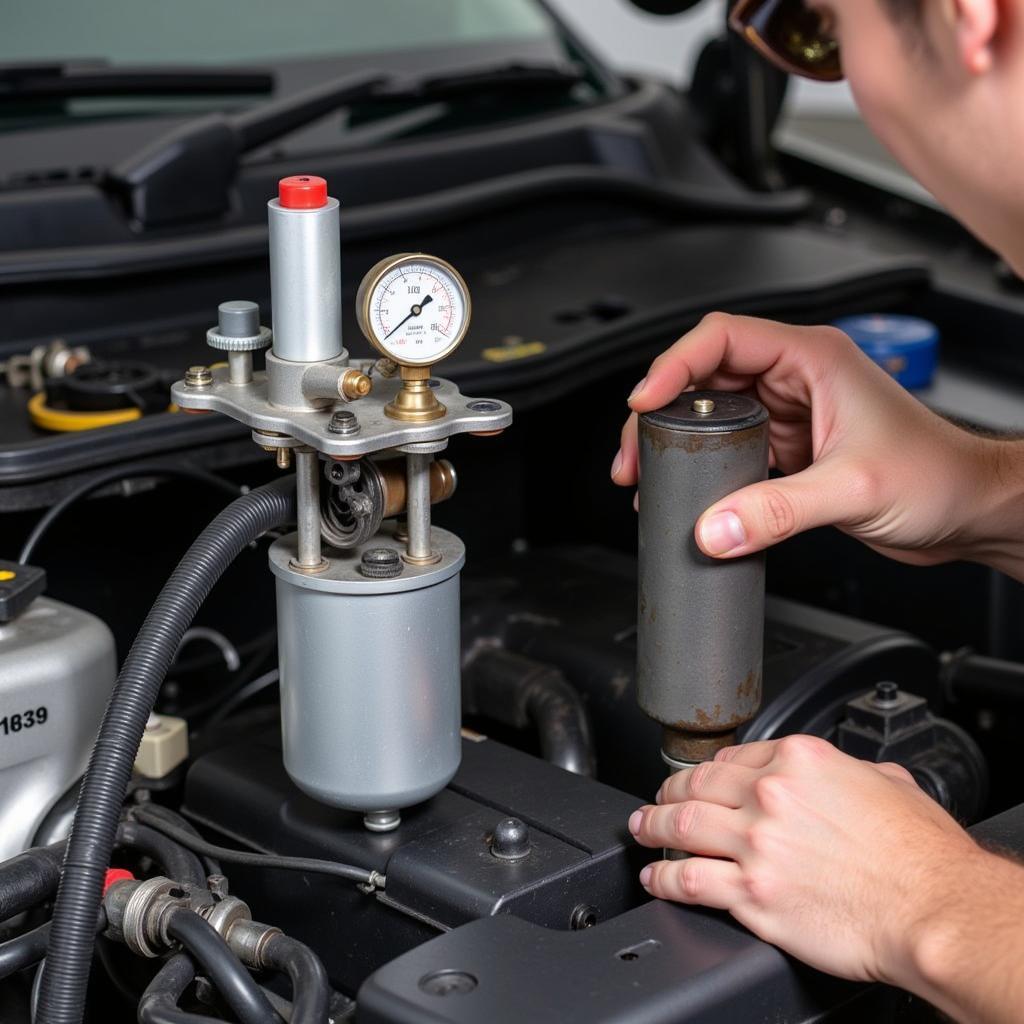 Fuel Pump and Filter Related Car Starting Problems
Fuel Pump and Filter Related Car Starting Problems
Malfunctioning Fuel Injectors
Fuel injectors are responsible for spraying fuel into the engine cylinders. If an injector is clogged or faulty, it can disrupt the combustion process, preventing the engine from starting. Symptoms of bad fuel injectors can include rough idling, misfires, and decreased fuel efficiency.
Fuel Pressure Regulator Issues
The fuel pressure regulator maintains the correct fuel pressure in the fuel system. A faulty regulator can cause either too much or too little fuel to reach the engine, both of which can lead to starting problems.
Diagnosing Car Won’t Start Fuel Problems
Accurately diagnosing the root cause is crucial for effective repair. Here’s a step-by-step guide to help you troubleshoot “car won’t start fuel problems.”
- Check the Fuel Gauge: Ensure you have sufficient fuel in the tank.
- Listen for the Fuel Pump: When you turn the key to the “on” position (without starting the engine), you should hear a quiet humming sound from the fuel pump. If you don’t hear anything, it could indicate a faulty pump or a problem with the fuel pump relay.
- Check the Fuel Pressure: Use a fuel pressure gauge to check the fuel pressure at the fuel rail. Compare the reading with your vehicle’s specifications to determine if the pressure is within the acceptable range.
- Inspect the Fuel Filter: A visually dirty or clogged fuel filter should be replaced.
- Test the Fuel Injectors: You can use a noid light or multimeter to test the electrical signal to the fuel injectors. If there’s no signal, it could indicate a wiring problem or a faulty injector driver.
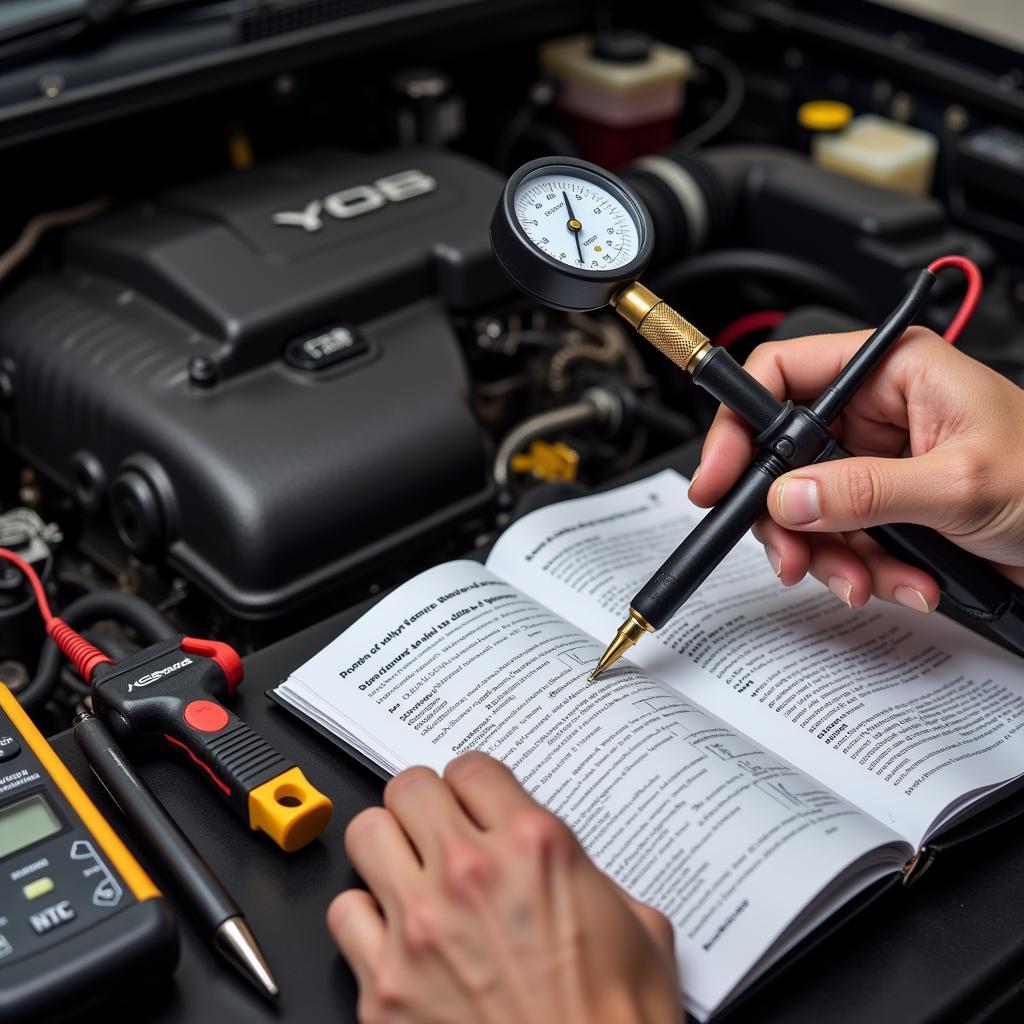 Diagnosing Car Starting Problems Related to the Fuel System
Diagnosing Car Starting Problems Related to the Fuel System
Just like if a car won’t start what could be the problem, you may need professional help if these preliminary checks don’t reveal the cause.
DIY vs. Professional Repair
Some fuel system repairs, such as replacing the fuel filter, are relatively straightforward and can be done by DIYers. However, more complex tasks like replacing the fuel pump or injectors often require specialized tools and knowledge. If you’re not comfortable working on your car’s fuel system, it’s best to seek professional help.
“A thorough diagnostic is key to fixing fuel-related starting problems,” says veteran automotive technician, Robert Hernandez. “Don’t just throw parts at the problem. Take the time to identify the root cause to save time and money.”
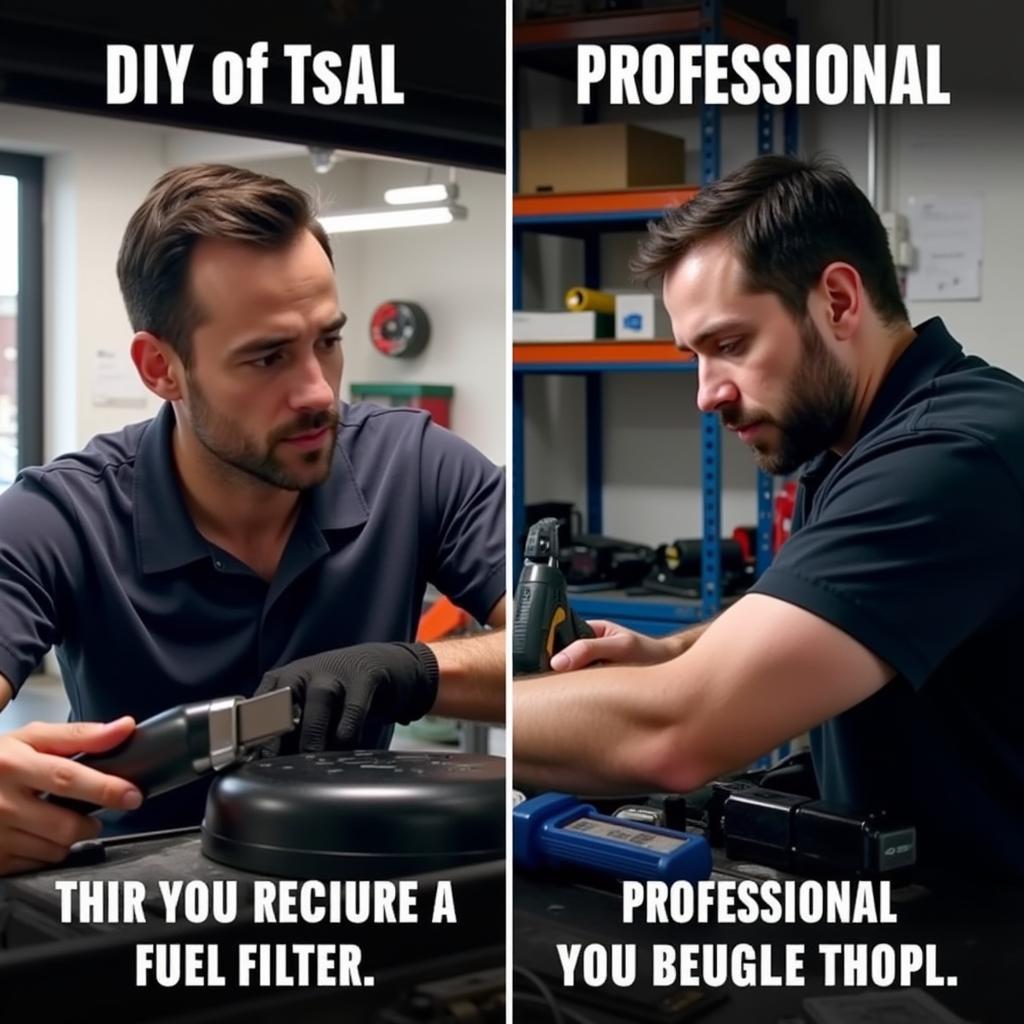 DIY vs Professional Car Repair for Fuel System Issues
DIY vs Professional Car Repair for Fuel System Issues
Preventing Car Won’t Start Fuel Problems
Regular maintenance is the best way to prevent “car won’t start fuel problems.” This includes replacing the fuel filter at the recommended intervals, keeping your fuel tank at least a quarter full, and using quality fuel.
“Preventive maintenance is like an insurance policy for your car,” says Sarah Chen, automotive engineer. “Regularly servicing your fuel system can save you headaches and costly repairs down the line.”
If you find that your car wont start common problems seem to be recurring, it’s even more important to prioritize preventative measures.
Conclusion
“Car won’t start fuel problems” can be frustrating, but by understanding the potential causes and following the diagnostic steps outlined in this guide, you can effectively address the issue. Whether it’s a simple fix like adding fuel or a more complex repair, taking the right approach can get you back on the road quickly. If you need further assistance, connect with AutoTipPro at +1 (641) 206-8880 or visit our office at 500 N St Mary’s St, San Antonio, TX 78205, United States.
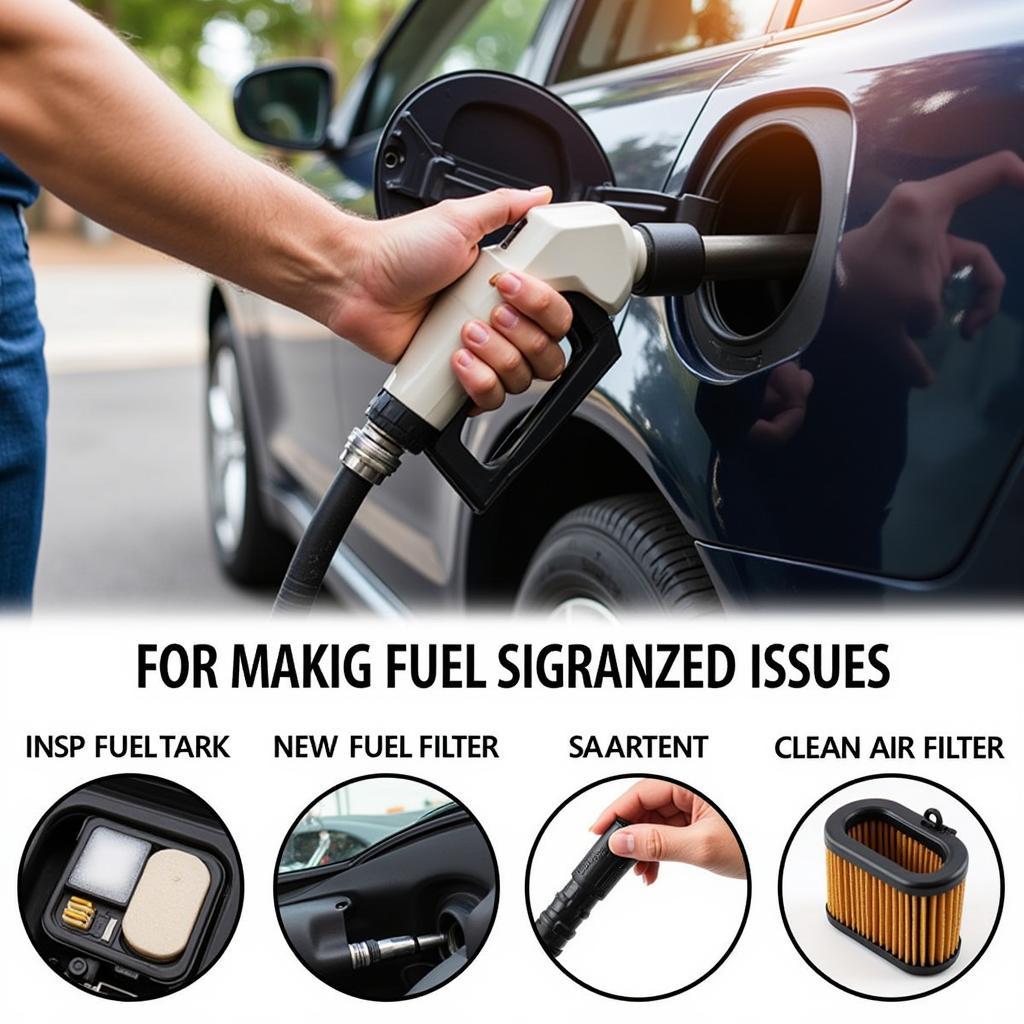 Preventing Car Starting Problems through Fuel System Maintenance
Preventing Car Starting Problems through Fuel System Maintenance
Addressing fuel problems early can also prevent cascading issues with other components, like encountering car camshaft problems later on. Similarly, learning how to diagnose a car engine problem can help you tackle various issues, not just fuel-related ones.




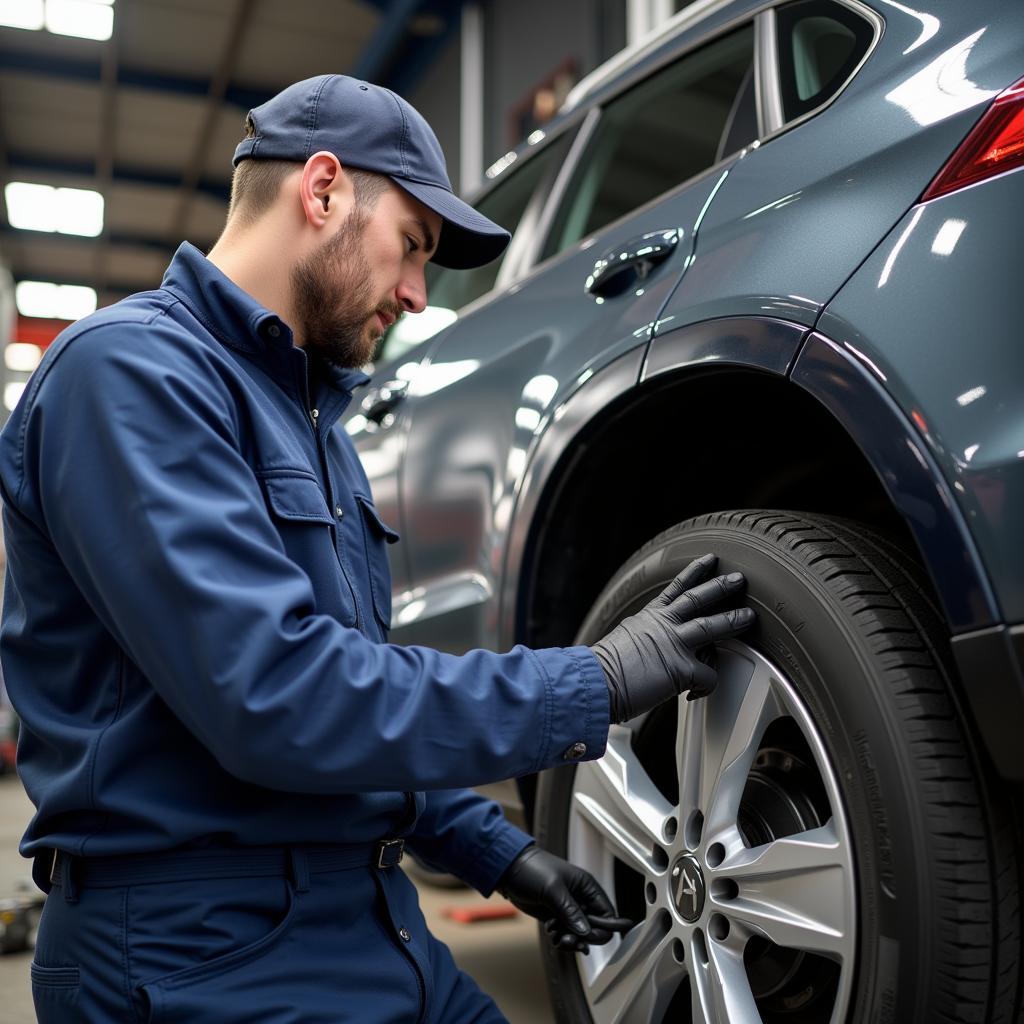
Leave a Reply